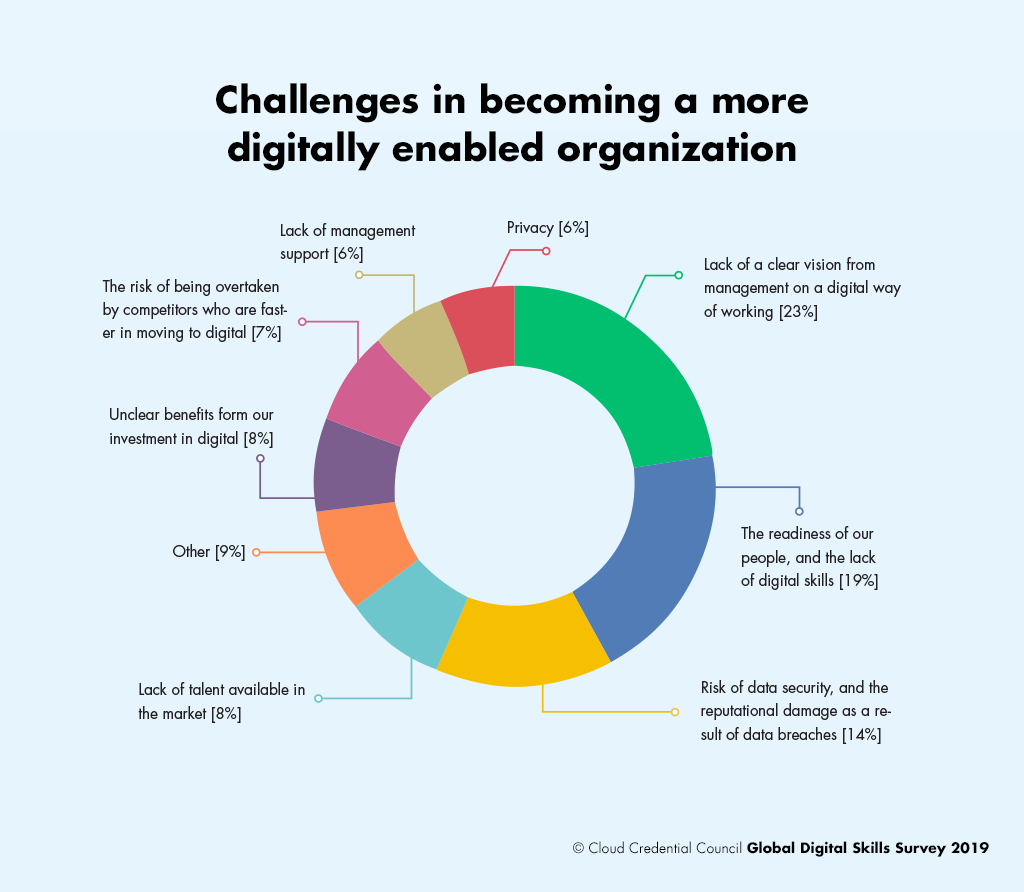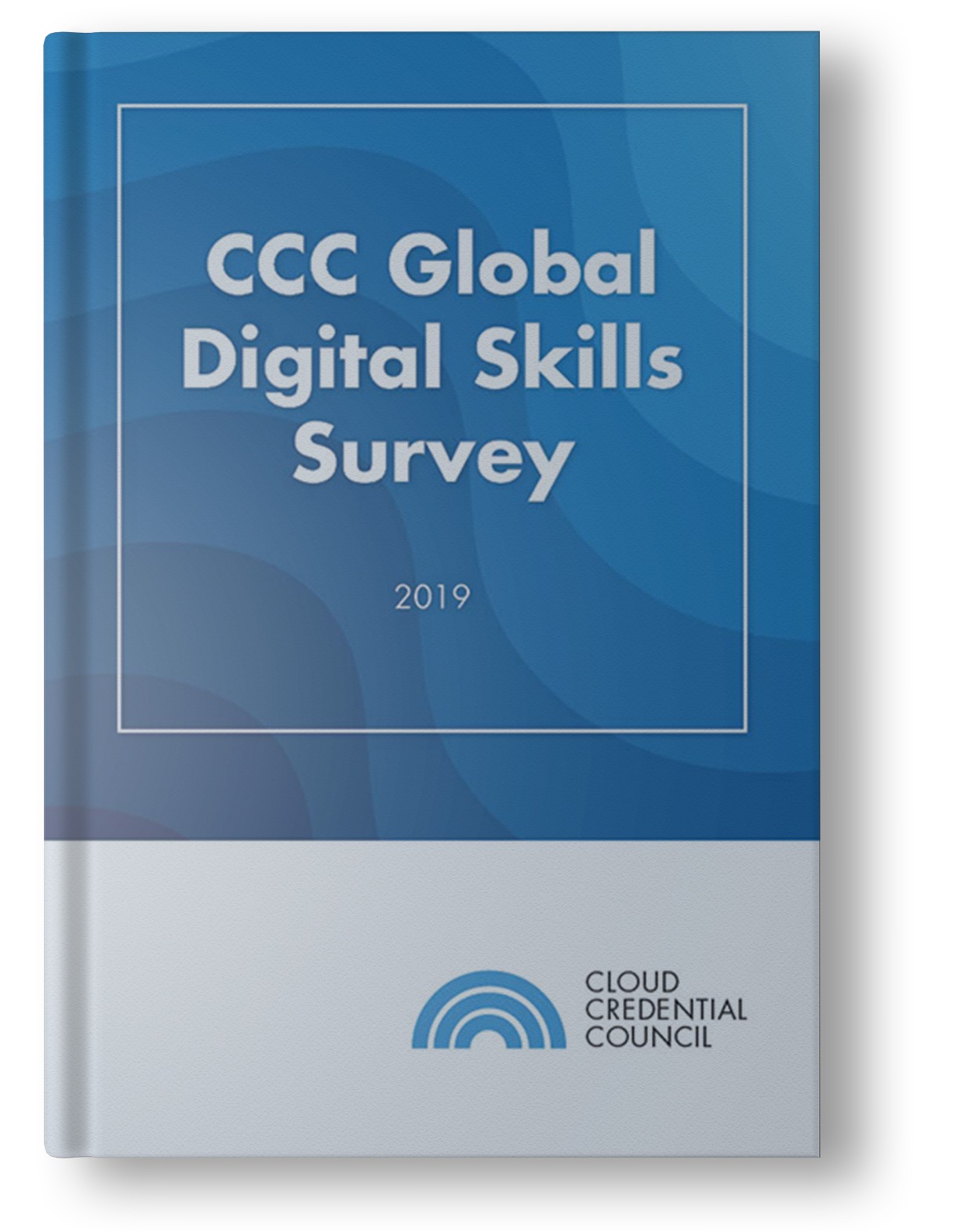Challenges in Becoming a More Digitally Enabled Organization

Joey van Kuilenburg

Our Global Digital Skills Survey 2019 report identifies three critical and eight key findings. The analysis covers cultural, individual, and organizational readiness for the changes which are being brought about through the impact of digital.
In this blog, I am focusing on the following critical finding:
Challenges In Becoming A More Digitally Enabled Organization
Adoption of cloud and Digital IT is on the rise. We know this. We see this. We believe this. However, what is also on the increase is the rise in the complexity around the interoperability of various hybrid and multi-cloud services and various Digital IT services including Cloud, Internet of Things (IoT), Big Data, Blockchain, and Artificial Intelligence (AI), etc. The more an organization delves into cloud and Digital IT services, the more complex it becomes to architect, operate and secure the services from a corporate perspective.
Architecture and design are now based on vendors’ architecture and designs access via APIs and permitted Infrastructure-as-a-Service (IaaS) tools. While an underlying IaaS infrastructure provided by a cloud vendor is maintained, patched, secured and managed by the cloud vendor; anything built or installed on top of that IaaS is to be maintained, patched, secured and managed by the organization or their IT function. On one-hand; complexity removed via that IaaS model. On the other-hand complexity restored via the use of IaaS to install an application which the organization is responsible for.
Complexity is interesting when considered from a people, staff or talent perspective. A part of the IT that we used to create and deliver in the past is now being built, managed and provided by cloud and Digital IT vendors. Think of the many IaaS and SaaS applications now available. However, these are delivered under a different service model than Traditional IT.
The models are different, therefore how we manage cloud and Digital IT services changes; impacting the way people work. Cloud and Digital IT services are very agile. If you want to use more of their services, just consume more, auto-scale and provision more resources or services instantly. This is not how people in IT, or the organization, worked in days past. Adapting to an agile environment can be difficult. Many organizations have tried, yet when true improvement in agility is measured, significant gaps appear, and they are found wanting.
We asked respondents what they saw as the bigger risks facing their organizations as they develop and adopt more and more digital capabilities and technologies. The results are:
- Lack of a clear vision from management on a digital way of working [23%]
- Lack of management support [6%]
- The readiness of our people, and the lack of digital skills [19%]
- Lack of talent available in the market [8%]
- Privacy [6%]
- Risk of data security, and the reputational damage as a result of data breaches [14%]
- Unclear benefits form our investment in digital [8%]
- The risk of being overtaken by competitors who are faster in moving to digital [7%]
Grouping the first four results yields 56% of the total score; made up of issues and challenges relating to people. Over half the challenges coming from people, not technology. Lack of management support and vision coupled with an unready workforce to deal with cloud and Digital IT and a lack of talent in the labor force market presents a significant challenge.
These findings link directly back to the three critical findings identified in the full report CCC Global Digital Skills Survey 2019.

Regarding the focus on management issues, we asked respondents what they saw as the bigger risks facing their organizations as they develop and adopt more and more digital capabilities and technologies.
- Management not understanding the current digital landscape or the impact and disruption from digital technologies
- Management not understanding the benefits or the value proposition from digital enabling technologies such as IoT, Big Data, Artificial Intelligence (AI) and even cloud
- Hubris. A false self-belief that upskilling for management is not required. After all, managers manage and it’s the workers who need to upskill.
- Fragmentation in the training and education marketplace. Which certification, training, and education should be taken?
It is clear that the move to digital is something that is not taken lightly by the respondents; only 14% believe that their company will not be affected by the transformation to digital. However, there is a large number of barriers foreseen by companies making the move to digital which are not technology related.
What challenges face your organization and your staff In Becoming A More Digitally Enabled Organization and how little of these are on the technical side?

The CCC Global Digital Skills Survey 2019 Report
The report identifies three critical and eight key findings. The analysis covers cultural, individual, and organizational readiness for the changes which are being brought about through the impact of digital.

About the Author
Joey is a marketer who prefers to put in a bit of extra work to make an “ok” product or experience an amazing product or experience.
Never miss an interesting article
Get our latest news, tutorials, guides, tips & deals delivered to your inbox.
Keep learning



